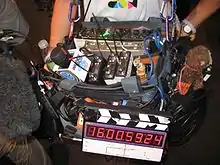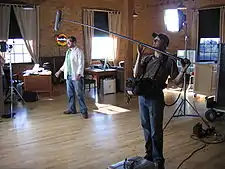Production sound mixer
A production sound mixer, location sound recordist, location sound engineer, or simply sound mixer is the member of a film crew or television crew responsible for recording all sound recording on set during the filmmaking or television production using professional audio equipment, for later inclusion in the finished product, or for reference to be used by the sound designer, sound effects editors, or foley artists (aka foley dancers). This requires choice and deployment of microphones, choice of recording media, and mixing of audio signals in real time.


Usually, the recordist will arrive on location with his/her own equipment, which normally includes microphones, radio systems, booms, mixing desk, audio storage, headphones, cables, tools, and a paper or computer sound logs. The recordist may be asked to capture a wide variety of wild sound on location, and must also consider the format of the finished product (mono, stereo or multi channels). The recorded production sound track is later combined with other elements, i.e. effects, music, narration, foley or re-recorded dialog by automatic dialogue replacement (ADR).
Often, when taping on video, the sound recordist may record (single system) audio directly onto the camera rather than use a separate medium (double system), although a separate copy is often made, as it both provides an extra copy which may have more tracks and also may include other sound captured without the camera.
The sound mixer is considered a department head, and is thus completely responsible for all aspects of production sound including the hiring of a boom operator and utility sound technician, planning the technical setup involving sound including both sound equipment and ancillary devices involved in syncing and time offsets, anticipating and discussing sound-related problems with the rest of the crew, and ordering and preparing the sound equipment to be used on the set.
References
- David Yewdall. The Practical Art of Motion Picture Sound. Focal Press, 1999.
- Vincent Magnier, Le guide de la prise de son pour l'image. Éditions Dunod/INA, 2007.
- John Purcell, Dialogue Editing for Motion Pictures: A Guide to the Invisible Art. Focal Press, 2009. ISBN 0240809181
- Jay Rose, Producing Great Sound for Film and Video. Focal Press, fourth edition 2014 Book info. ISBN 9780415722070
External links
- Longoria, Sam. Make Your Movie Sound Like A Real Movie - dead link
- Martinez, Carlos E. Location Audio for Any Budget, An Introduction - dead link
- Rose, Jay Film/video tutorials written for DV Magazine and others